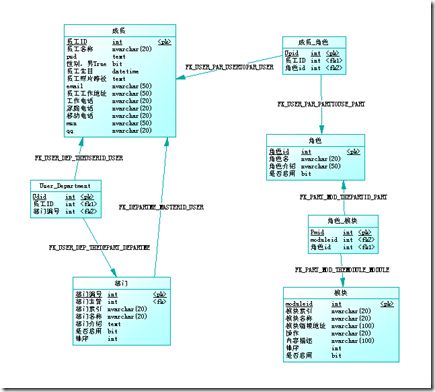权限设计 以及 树的存储
平时看到各位园子的朋友真的很厉害,设计了很多关于权限管理的东西,
很羡慕,但同时也觉得在一些小型项目上,那样的设计是否有点设计过度呢
其实这也说不清,可能是自己资历尚浅,还没看明白各位高人的设计
自己也写了个,帖出来请教下园子的各位朋友
用PD 弄了个图,
这里想说明的是关于部门表和模块表的 索引 字段
因为大家都知道部门是树结构的数据
那么怎样来体现这个树结构,成了很有意思的事情,
原来我的设想是 添加字段 “FatherElement” ,记录父节点的id
但是考虑到这个遍历表会遍历很多遍,效率貌似比较低
于是采用第二种方法
添加字段"ElementIndex" 之后编号规则为,父节点编号 + 双位自己的编号
考虑到方便处理,设置起始编号为10
如果不太明白的话,举个例子
博客园 里面有 新手区,精华区,新手区有这个blog 于是编号如下
------------------------------------------------------------
Name Index
------------------------------------------------------------
博客园 10
博客园新手区 1010
博客园精华区 1011
博客园新手区的第一篇文章 101010
博客园新手区的第二篇文章 101011
------------------------------------------------------------
这样的话,当用select 语句的时候,读到一个记录后就可以以它的索引加"__"寻找它的字节点了,
写个递归,一个树就轻松加愉快的出来了。
这是自己做的个生成Ext中tree 所需要的代码。
欢迎博客园各位达人能给小弟一些意见,建议,本人在此先谢谢了。
using System;
using System.Data;
using System.Configuration;
using System.Web;
using System.Web.Security;
using System.Web.UI;
using System.Web.UI.WebControls;
using System.Web.UI.WebControls.WebParts;
using System.Web.UI.HtmlControls;
using System.Text;
/// <summary>
/// 在这里我使用了theModule.xsd作为我的数据提供,
///最后的筛选条件是 WHERE ModuleIndex LIKE @theIndex
/// <author>
/// ATPKING
/// </author>
/// <time>
/// 2008-6-5
/// </time>
/// </summary>
public class BuildModuleTree
{
private StringBuilder JsonStr;
public BuildModuleTree()
{ } /// <summary>
/// 建立一个Json形式的字符串,来自于表Module,使用一个索引编号制定根节点。
/// </summary>
/// <param name="rootModuleIndex">根节点的编号</param>
/// <returns></returns>
public string buildModuleTree(string rootModuleIndex)
{
JsonStr = new StringBuilder();
string theIndex = rootModuleIndex + "__";
//根据索引设计规则,它的子节点必然为它自身的节点再加两位
theModule.ModuleDataTable themodule = this.theModule(theIndex);
//返回一个强类型的datatable
this.buildTree(themodule);
JsonStr.Remove(0, 9);
return JsonStr.ToString();
}
/// <summary>
/// 建立一个Json形式的字符串,来自于表Module,从根节点开始执照
/// </summary>
/// <returns></returns>
public string buildModuleTree()
{
string temp = this.buildModuleTree("");
return temp;
}
private void buildTree(theModule.ModuleDataTable themodule)
{
JsonStr.Append("children:[");//建立子结点
foreach (theModule.ModuleRow row in themodule)
{
JsonStr.Append("{ ");
JsonStr.Append("text:");//此为ModuleName
JsonStr.Append("'" + row.ModuleName + "'");
string tempIndex = row.ModuleIndex;//获取这个节点的索引
theModule.ModuleDataTable tempModule =
this.theModule(tempIndex + "__");//获取此节点的子节点表
if ( tempModule.Rows.Count == 0 ) //如果子节点表为空
{
JsonStr.Append(",leaf:true"); //则标记该节点为叶子节点
}
else
{
JsonStr.Append(","); //如果该节点的子节点表不空,
buildTree(tempModule); //递归查询子节点
}
JsonStr.Append("},");
}
JsonStr.Remove(JsonStr.Length - 1, 1);
JsonStr.Append("]");
}
/// <summary>
/// 返回一个theModule的强模型
/// </summary>
/// <param name="tempIndex">子模块的索引</param>
/// <returns></returns>
private theModule.ModuleDataTable theModule(string tempIndex)
{
theModuleTableAdapters.ModuleTableAdapter temp1 =
new theModuleTableAdapters.ModuleTableAdapter();
return temp1.GetData(tempIndex);
}
}
